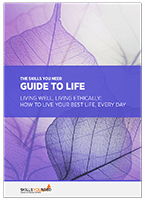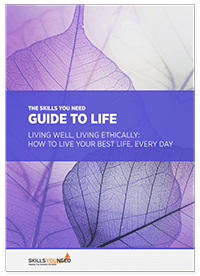A Framework For Learning To Live Well
See also: Learning StylesOur page on Goodness explains how to start using your moral compass, and some steps that you can take to help you manage your emotions and develop a more virtuous way of living.
This page sets out a more systematic view, a framework, of how you can assess the development of your more virtuous self.
This framework can be used for any virtue or good way of living. It will help you to review your actions after the event, and also assess them beforehand, although this is harder. It will also help you assess your progress and learning.
Four Levels of ‘Goodness’
It may help if you think about learning to behave in a more virtuous way as a four-stage process.
At this stage, you have not yet developed your moral compass into a strong tool to help to guide you. Your ideas about what counts as the ‘good’ course of action may therefore be a little unwise. You may also struggle to manage your emotions. The combination of not knowing the right thing to do, and being driven by your emotions, is likely to mean that your actions are also unwise.
Result: You will probably need something of a rethink as your actions are likely to cause pain or discomfort to others.
At this stage, your moral compass is developing rapidly. You are starting to have a much better sense of what you should do. However, your emotions are still likely to be driving quite a lot of what you do. As a result, your actions may still not be quite right.
Result: Your actions may still be causing pain or discomfort to others, but at least you’re aware of the problem!
By now, your moral compass is really quite well developed. You can consult it as a pretty sure guide to what is the right thing to do. You are also gaining considerable mastery over your emotions. Even when you don’t want to do something, you are able to use reason to gain control over your emotions and ensure that you do the right thing. However, you may be doing the right thing “through gritted teeth”, because your emotions tell you to do something quite different.
Result: Well done! You are doing the right thing, even if it is through gritted teeth
At this stage, you can consider that you have pretty much mastered the art of virtuous living, at least insofar as this particular action or situation is concerned. You know the right thing to do, your emotions tell you that it is the right thing to do, and you do it freely and willingly. This may sound a bit too good to be true, but reaching this stage will feel ‘right’.
Result: You are spot on, and can consider yourself to be virtuous.
We can summarise these four stages into a table:
| Stage | State of character | Emotions: how do I feel? | Options and my choices: what could I do? | Actions: what did I do? |
| Absolute Beginner | Unwise – need a rethink | WRONG | WRONG | WRONG |
| Learner | Incontinent – knowing the right thing to do, but getting carried away by emotions | WRONG | RIGHT | WRONG |
| Nearly There | Continent – doing the right thing, but through gritted teeth | WRONG | RIGHT | RIGHT |
| Virtuous Living | Virtuous | RIGHT | RIGHT | RIGHT |
Based on material from the Jubilee Centre for Character and Virtues, University of Birmingham
You can clearly see that at each stage of development, you have mastered one more area:
First, you develop an understanding of the right thing to do by using reason to develop your options and choices;
Second, you gain mastery over your actions by using reason to suppress your emotional response, and ensure that you are behaving in a way that matches what you know to be right; and
Finally, you gain mastery over your emotions so that your emotional response to the situation is also ‘right’, as well as your actions.
Models of Learning
If you are familiar with any models of learning, you may find this process sounds somewhat familiar. It is broadly based on the model of the competence cycle.
There is more about this on our page on Coaching.
Broadly, the model sets out that you learn in four stages:
‘Unconscious incompetence’, where you don’t know what you don’t know. This equates to the ‘Absolute Beginner’ stage here;
‘Conscious incompetence’, where you know what you can’t do, but you don’t know how to do it, which equates to the ‘Learner’ stage here;
‘Conscious competence’, where you know what to do, but you still find it difficult. This is the ‘Nearly there’ stage; and
‘Unconscious competence’, where you have ‘internalised’ the learning and you do the right thing without thinking about it.
Further Reading from Skills You Need
The Skills You Need Guide to Life: Living Well, Living Ethically
Looking after your physical and mental health is important. It is, however, not enough. Maslow’s famous hierarchy of needs suggests that most of us need more than that. We need to know that we are living our ‘best life’: that we are doing all we can to lead a ‘good life’ that we will not regret later on.
Based on some of our most popular content, this eBook will help you to live that life. It explains about the concepts of living well and ‘goodness’, together with how to develop your own ‘moral compass’.
Worthwhile Achievements are Seldom Easy
It may sound like a cliché, but there is little sense of achievement in something that comes easily. Fortunately, nobody ever said that learning to live virtuously was going to be easy, which means that the sense of achievement should be much greater.
There will, however, be times when you despair of ever getting there. The framework on this page may provide a helpful guide to how far you have come, and serve to show you that success may be closer than you think.
See also:
Generosity
Friendliness | Justice and Fairness


